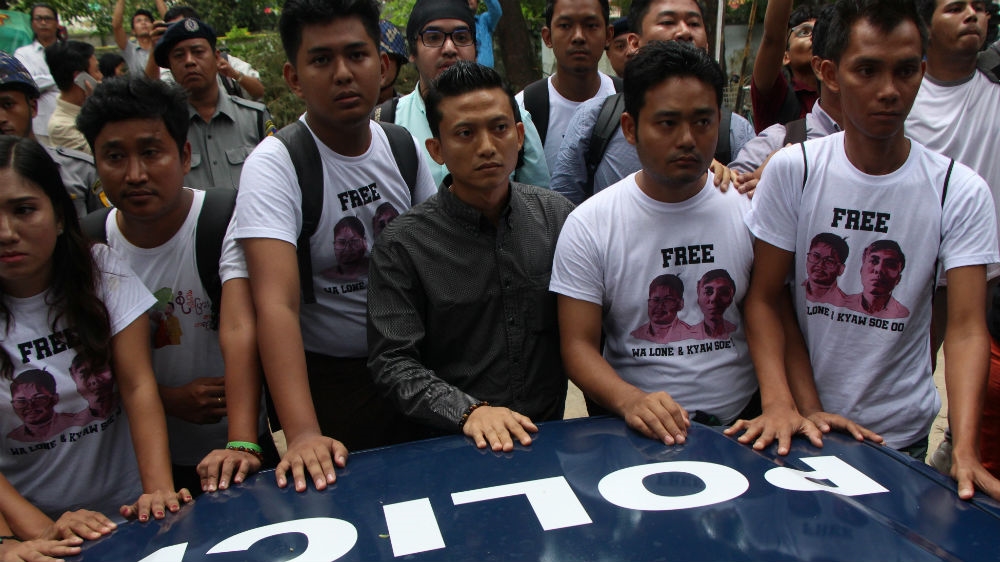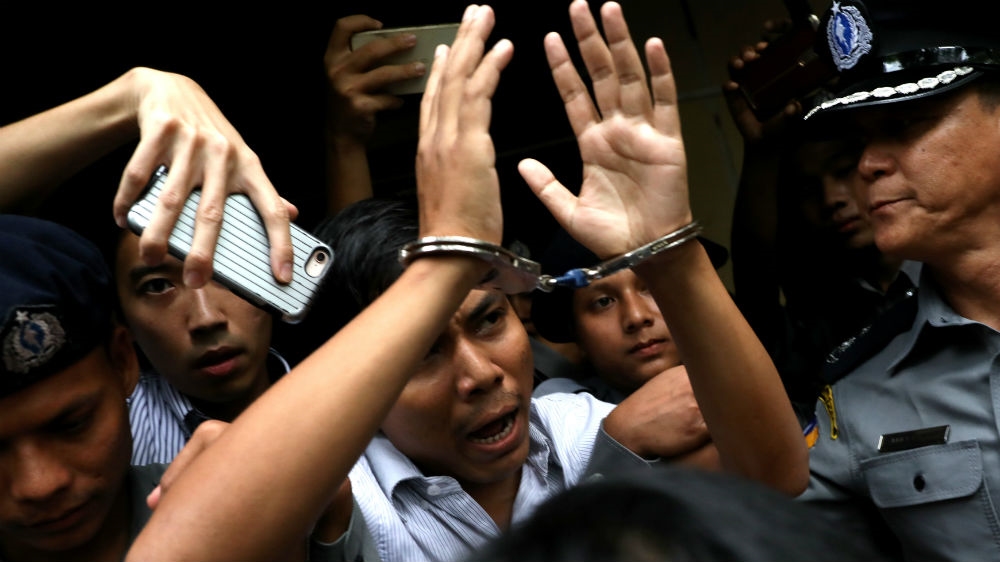In Aung San Suu Kyi’s Myanmar, free press hopes wither
Yangon, Myanmar – Screams of “Let them speak!” filled the air as a group of journalists stood in front of the police wagon holding Reuters reporters Wa Lone and Kyaw Soe Oo soon after they were convicted in September of violating Myanmar’s colonial-era Officials Secrets Act.
The gathered journalists beat on the vehicle’s sides but police shoved them away, allowing it to lurch forward. Inside the van, the pair gave one last smile through the barred windows as they were driven away to Yangon’s Insein Prison.
Both were given jail terms of seven years.
Wednesday marks a year since Wa Lone and Kyaw Soe Oo were detained for investigating the killing of 10 Rohingya civilians by Myanmar soldiers during last year’s brutal crackdown in Rakhine state that saw hundreds of thousands fleeing to Bangladesh in search of safety.
The reporters’ case has become emblematic of the increasing problems faced by Myanmar’s media, despite a landmark election in 2015 that brought Nobel Peace Prize laureate Aung San Suu Kyi and her National League for Democracy (NLD) to power.
|
Myanmar jailing of Reuters journanists condemned |
‘Hopeful moment’
During the decades of military rule, Myanmar’s media was severely restricted.
Many journalists were forced to flee or work as dissidents reporting from the country’s border regions. Others were jailed or killed.
But when Thein Sein, a leading member of the military government, came to power in 2011, things began to change.
“There was a very hopeful moment during the Thein Sein period when censorship ended and jailed journalists were set free,” Shawn Crispin, senior Southeast Asia representative for the Committee to Protect Journalists, told Al Jazeera. “But even then journalists knew they weren’t really free to report on the military and their endemic corruption.”
While official censorship of publications had ended, journalists reporting on military activities continued to be killed or arrested.
When Aung San Suu Kyi – a democracy advocate who spent some 15 years under house arrest during Myanmar’s military dictatorship – won the country’s first democratic election in decades, many assumed it would also be a victory for the freedom of the press.
“We very quickly realised that wouldn’t be the case,” Crispin said.
Ambiguous laws
Shortly after the NLD was elected, several high-profile political prisoners, including journalists, were pardoned and released.
But the hope was short-lived.
The party quickly adopted a policy of not speaking to journalists without approval from the top levels of government. Meanwhile, officials with a history of animosity towards international media were hired for high-ranking communications roles, while repressive laws that fell short of international free-speech standards remained on the statute books.
 |
| Journalists stand in front of the police vehicle carrying Wa Lone and Kyaw Soe Oo to prison after the court verdict was announced in September. [Myo Kyaw Soe/Reuters] |
Suddenly, there was a spike in cases brought under Section 66D of the 2013 Telecommunications Law.
An ambiguously-worded section, intended to safeguard against defamation, created an environment where people could be sued for anything from sharing a Facebook post to insulting the government.
According to an October statement from Athan, a freedom of expression advocacy organisation, more than 44 journalists in Myanmar have faced trial since the NLD took power, with a majority of the cases being filed under 66D.
“When we documented and published a list of journalists being sued under the Telecommunications Law, it clearly showed freedom of expression is declining in Myanmar,” said Maung Saungkha, one of Athan’s founders and a former political prisoner convicted under 66D.
“Without freedom of expression, we can’t protect human rights, including access to information.”
Other policies continued to hinder press freedom as well.
Access to large parts of the country – largely in ethnic areas where the military were active – remained off limits to reporters. Getting permission to visit these areas, including the Rohingya refugee camps in Rakhine, became increasingly difficult.
International and former dissident journalists began to face more restrictive visa requirements and, in the wake of the Rohingya crisis, started to receive harsh pushback from the Myanmar government and Aung San Suu Kyi, who claimed international media were publishing “hate narratives” that were driving Myanmar communities apart.
‘A trap for journalists’
“Perceptions of journalists, in general, have certainly shifted in recent years,” said Kimberly Phillips, a freelance journalist who used to work with dissident media outlet Democratic Voice of Burma.
“In 2015, many people knew names and had positive relations with the [publication], but a few years later nearly three-quarters of people wouldn’t want to talk to me or voiced criticism when I told them who I worked for.”
Myanmar was ranked 137st, out of 180, countries in this year’s Reporters without Borders’ World Press Freedom Index, dropping six places compared to 2017.
|
|
|
Kyaw Soe Oo leaves court in Yangon after being sentenced to seven years in prison for violating Myanmar’s Official Secrets Act. [Ann Wang/Reuters] |
Reuters’ Wa Lone and Kyaw Soe Oo were picked up on the evening of December 12 after they had been invited to meet police officials over dinner on the outskirts of Yangon.
There they were handed a set of documents that they were told were related to their investigation into the massacre in the Rohingya village.
Despite one officer testifying that the duo was deliberately set-up and military officials admitting the murders took place, the journalists were found guilty of breaking the Official Secrets Act and sentenced to seven years in prison.
Reuters editor-in-chief, Stephen J. Adler, said the charges were “designed to silence their reporting and intimidate the press”.
For Crispin, the decision was a “clear and chilling message that no journalist is safe when reporting critically on the government or military”.
 |
| Wa Lone gives the thumbs-up as he leaves a Yangon court after being convicted of breaking the Official Secrets Act. [Myat Thu Kyaw/Reuters] |
The conviction of the two journalists came on the same week the International Criminal Court ruled it had jurisdiction to investigate the crimes that had been committed against the Rohingya.
In response, government spokesperson Zaw Htay told reporters that he would no longer take phone calls, but instead hold fortnightly press briefings.
“The government is basically very tightly controlling information, which means it is hard for us to deal with rumours, combating fake news and gathering correct information,” said Zayar Hlaing, a member of the Myanmar Press Council. “They do not allow freedom of access to information. It’s like a trap for journalists- you can write what you want, but after you publish it’s uncertain what will happen.”
‘Democracy cannot flourish’
Foreign diplomats, United Nations officials and even celebrities have condemned the verdict against Wa Lone and Kyaw Soe Oo, calling for their release. Activists in Myanmar are also mobilising.
But progress has been slow.
Late last month, Aung San Suu Kyi met representatives of the Myanmar Press Council. She told them that she did’’t trust the media and was sceptical about allowing journalists greater access to information.
“There is certainly friction between [her] and journalists,” said Zayar Hlaing.
But the press council is not giving up.
“We are trying to create a dialogue to find a solution, but she is turning away from the problem,” Zayar Hlaing said. “The government needs to care about press freedom. If it fails to create a free press, then it fails to create a successful democratic reform.”





